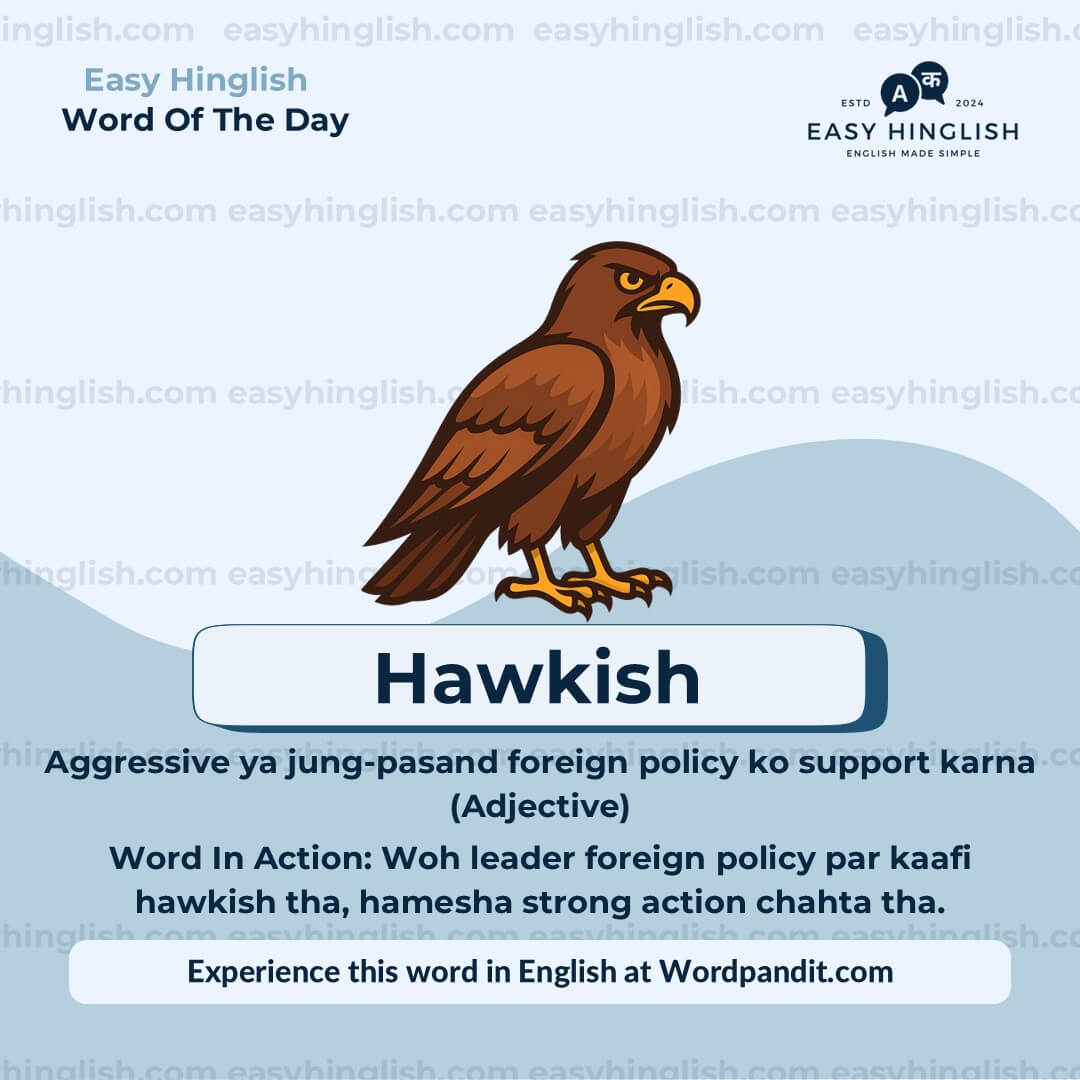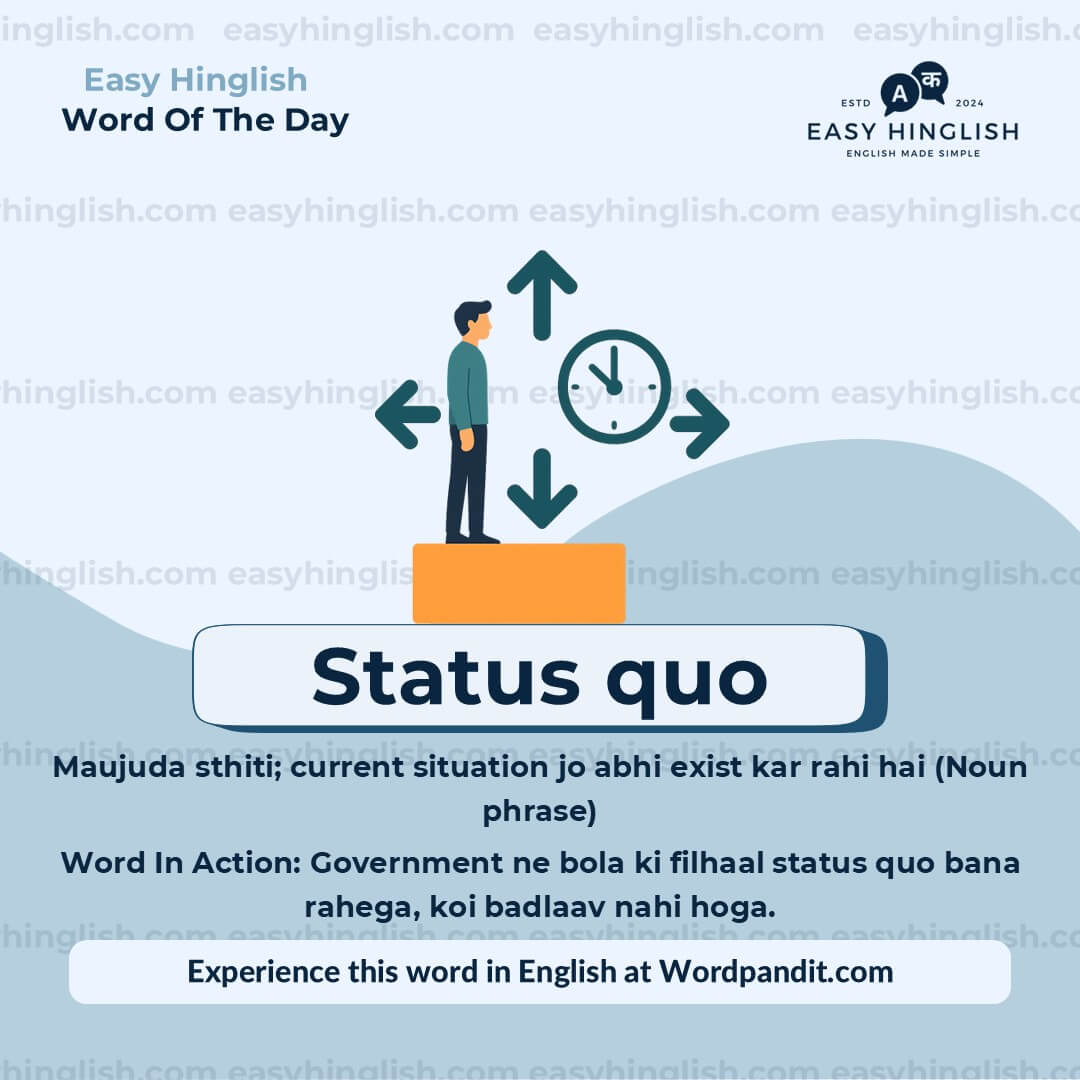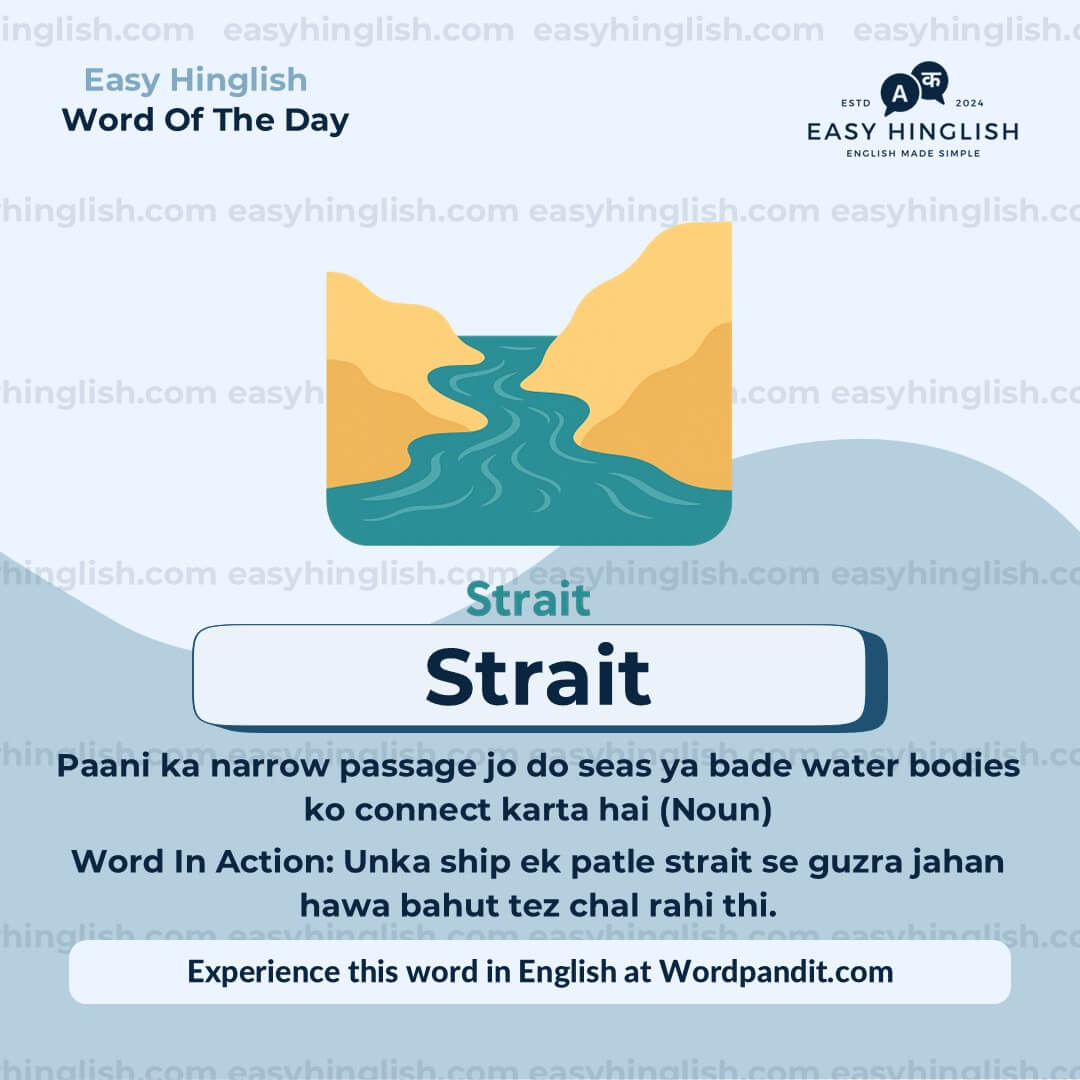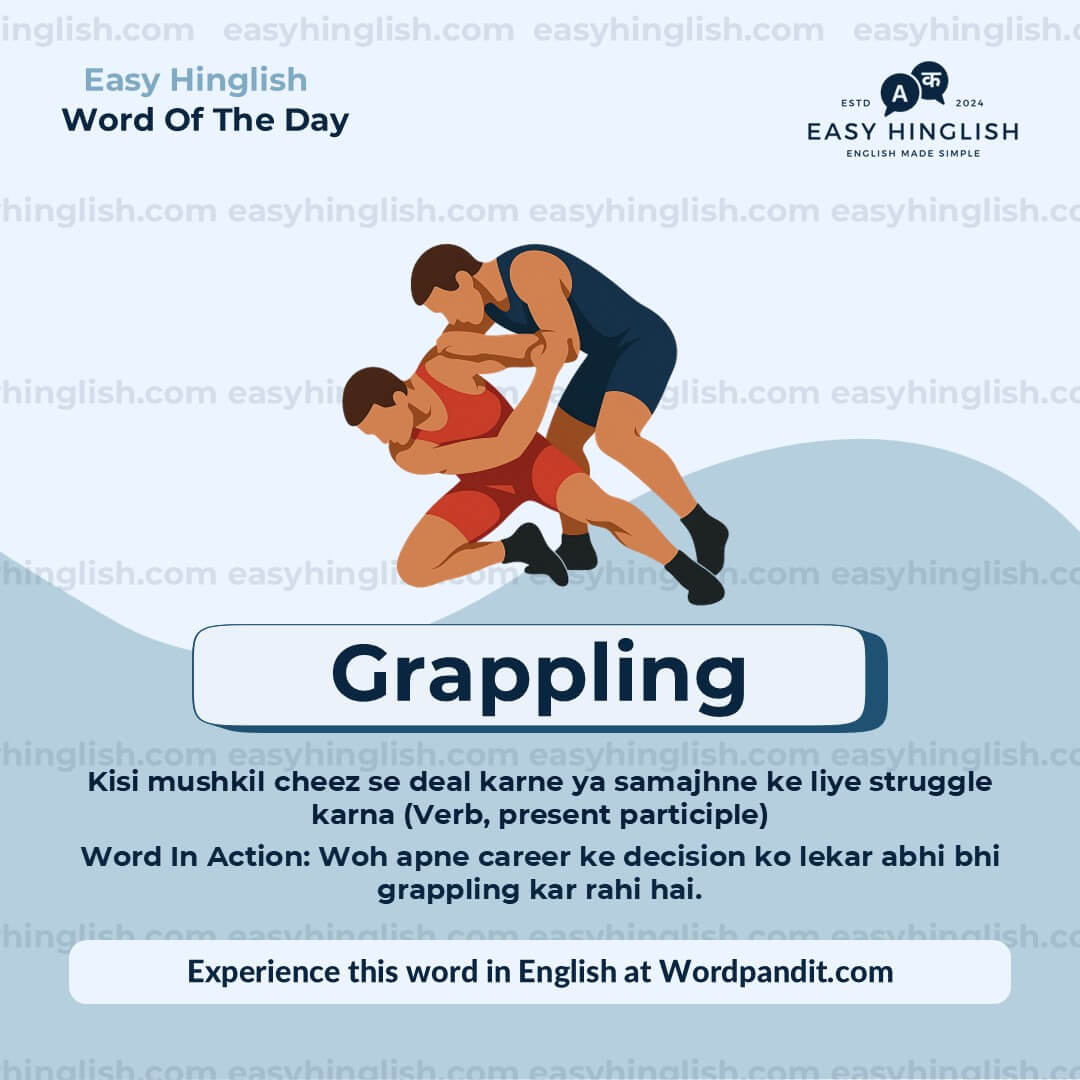Daily Vocabulary Indian Newspapers aur Publications se Seekho
Welcome to Wordpandit ka Indian Vocabulary Hub
Wordpandit par, hum samajhte hain ki ek achhi vocabulary develop karne ke liye local context samajhna bhi zaroori hai. Is section ka focus hai aapke vocabulary ko India ke leading newspapers aur publications se naye shabdon aur phrases ke zariye improve karna, taaki aap practical, relevant, aur uniquely Indian words seekh sakein.
Indian Sources Itne Important Kyun Hain?
Hum maante hain ki kisi bhi language ko sikhne ka sabse best tareeka hai uske local content me immerse hona. Isi wajah se hum carefully words curate karte hain top Indian newspapers aur publications se, jaise:
- The Hindu
- The Times of India
- The Economic Times
- Hindustan Times
- Live Mint
- The Indian Express
- Aur bhi bahut saare...
Hamesha Updated Raho, Hamesha Relevant Raho
Daily updates ke saath, aap Indian news sources se naye words seekhoge jo Indian society aur culture ke latest trends ko reflect karte hain. Hamara focus hai aise words provide karna jo aapke liye real-world me useful ho.
Wordpandit Aapke Learning Goals Ko Kaise Support Karta Hai?
Chahe aap exams ki preparation kar rahe ho, professional communication improve karna chahte ho, ya sirf naye words seekhna chahte ho, Wordpandit har step par aapki madad karega.
Practical Tareeke Se Seekho
Hamari interactive learning methodology me real-world examples, engaging activities, aur context-based usage shamil hain, taaki har naya shabd aapki active vocabulary ka hissa ban sake.
Aaj Hi Indian Vocabulary Seekhna Shuru Karo!
Wordpandit Kyun Choose Karein?
Practical Learning: Aise words seekho jo aapko real-world reading aur communication me sach me kaam aayenge, taaki aapki comprehension aur bolne ki skills improve ho.
Diverse Content: Current affairs se lekar scientific breakthroughs tak, hamare different sources aapko multiple domains ka vocabulary sikhate hain.
Effortless Integration: Wordpandit ko apni daily routine ka part banao. Sirf kuch minute har din dene se aapki vocabulary time ke saath kaafi improve ho sakti hai.
Aapka Vocabulary Mastery Tak Ka Safar
- Regularly hamare Daily Vocabulary section ko visit karo
- Naye words explore karo aur unka context me use samjho
- In words ko apni writing aur bolne ki practice me use karne ki koshish karo
- Jaise-jaise aapke words badhte hain, apni progress ko track karo
Aaj Se Apni Vocabulary Journey Shuru Karo!
Wordpandit ke saath vocabulary improve karna start karo. Roz thoda effort dalne se aap ek strong vocabulary develop kar sakte ho jo academic, professional, aur personal life me kaafi kaam aayegi.
Yaad rakho, ek naya shabd roz seekhna linguistic limitations ko door karne ka best tareeka hai! Wordpandit ko apni daily learning journey ka sathi banao aur vocabulary excellence ki taraf badho!
WORD-1: Hawkish
Sandarbh (Context):
"In the first Trump administration, Taiwan policy was shaped by figures such as Secretary of State Mike Pompeo who were decidedly hawkish on China and the issue of Taiwan." - The Wire
Vyakhya (Explanatory Paragraph):
Hawkish ka matlab hai 'aggressive ya jung-pasand niti ko support karna, khaas taur par foreign policy mein.' Yeh word tab use hota hai jab politicians, policies, ya positions ko describe karna ho jo confrontation, military strength, ya tough stance ko support karte hain rather than diplomatic compromise ke. Hawkish ko formal writing, international relations ke news articles aur competitive exam passages mein use karte hain jab political ideologies aur strategic approaches ko analyze karna ho.
Arth (Meaning): Aggressive ya jung-pasand foreign policy ko support karna (Adjective)
Uccharan (Pronunciation): HAW-kish (हॉ-किश)
Kathinai Star (Difficulty Level): ⭐⭐⭐ Intermediate
Utpatti (Etymology): Hawkish word 'hawk'—ek shikari bird jo apne aggressive hunting behavior ke liye famous hai—ke metaphorical use se aaya hai un logon ko describe karne ke liye jo military action ko favor karte hain. Yeh term Vietnam War ke time American politics mein popular hua, jahan 'hawks' (war supporters) aur 'doves' (peace supporters) ke beech contrast tha. '-ish' suffix se noun adjective ban gaya jo hawk jaisi qualities ko policy positions mein dikhata hai.
Prashant Sir Ke Tathya (Prashant Sir's Notes):
Bahut students hawkish ko simply 'aggressive' samajh lete hain—lekin hawkish aur aggressive mein farak yeh hai ki hawkish specifically military ya foreign policy contexts mein use hota hai, general behavior ke liye nahi. CAT aur UPSC ke students ke liye, hawkish aksar RC passages mein international relations aur defense strategies ke context mein dikhta hai. Indian newspapers mein aapko 'hawkish stance on Pakistan' ya 'hawkish approach to border disputes' milega—yeh word turant signal karta hai ki military strength ko diplomatic negotiation se zyada preference di ja rahi hai. Hawkish ka sahi istemal kaise karein: typically yeh pattern follow karta hai '[leader/country] takes a hawkish position on [foreign policy issue].' Exam passages mein hawkish usually apne opposite 'dovish' ke saath paired hota hai contrasting political philosophies dikhane ke liye.
Samanarthi & Vipritarthi (Synonyms & Antonyms):
Samanarthi (Synonyms): militant, aggressive, warlike, bellicose, belligerent, combative, hard-line, confrontational, militaristic, jung-pasand
Vipritarthi (Antonyms): dovish, peaceful, conciliatory, diplomatic, pacifist, moderate, shanti-priya
Udaharan (Usage Examples):
- Defense Minister ke hawkish statements cross-border terrorism par opposition parties ko alarm kar diye jo diplomatic channels prefer karti thi.
- Investors ko dar hai ki naya hawkish monetary policy approach higher interest rates aur slower economic growth leke aayega.
- Kargil conflict ke dauran, Indian media coverage increasingly hawkish ho gayi, anchors Pakistan ke khilaf strong military retaliation demand kar rahe the.
- Rajesh ka business negotiation mein hawkish approach ulta pad gaya jab competitors hostile takeover attempt se simply walk away kar gaye.
Sanskritik Sandarbh (Cultural Reference):
"Indian foreign policy debates mein, hawkish versus dovish divide aksar border tensions ke dauran emerge hota hai, jahan kuch leaders military strength advocate karte hain jabki doosre dialogue aur restraint ko champion karte hain." - Indian political discourse mein common theme
Sochiye (Think About It):
Kya India ki strategic position neighboring countries ke taraf zyada hawkish policies ki zarurat rakhti hai, ya phir dovish approach long-term regional stability aur economic cooperation ke liye behtar rahega?
Chhoti Kriya (Quick Activity):
Aaj ke newspaper mein foreign policy ya defense par articles scan karein. Teen politicians ya commentators identify karein aur unke statements ko hawkish ya dovish classify karein, apni reasoning explain karte hue.
Yaad Karne Ka Tarika (Memory Tip):
'HAWK-ish' ko aise yaad rakhein: ek hawk—aggressive shikari bird jo swiftly upar se attack karti hai—ka visualization karein. Jaise hawk prey par aggressively swoops down karti hai, waise hi hawkish politicians peaceful negotiations ke bajaye aggressive military action ko favor karte hain. Yaad rakhein: Hawk = Attack = Aggressive foreign policy.
Vastavik Jeevan Me Upyog (Real-World Application):
News analysis, political commentary, aur international relations articles mein, 'hawkish' defense aur foreign affairs par policy positions ko describe karne ke liye essential vocabulary hai. Journalists iska use karte hain quickly communicate karne ke liye ki leaders military solutions favor karte hain ya diplomatic ones. Competitive exam aspirants ke liye, hawkish ko samajhna geopolitical conflicts, arms races, aur international relations mein deterrence aur dialogue ke balance ke baare mein passages decode karne mein madad karta hai.
WORD-2: Status Quo
Sandarbh (Context):
"The preferred settlement on Taiwan for the short to medium term is status quo." - The Wire
Vyakhya (Explanatory Paragraph):
Status quo ka matlab hai 'mौजूदा halat ya current situation jo abhi chal rahi hai.' Yeh Latin phrase tab use hota hai jab cheezein jaise hain waise hi maintain karni hon, bina kisi badlav ya disruption ke. Status quo ka upyog formal discussions mein important hai—yeh commonly political analysis, business strategy documents, conflicts ke news articles aur competitive exam passages mein dikhta hai jahan current situation ko preserve karna changes karne se zyada prefer kiya jata hai.
Arth (Meaning): Maujuda sthiti; current situation jo abhi exist kar rahi hai (Noun phrase)
Uccharan (Pronunciation): STAY-tus KWO (स्टेटस क्वो)
Kathinai Star (Difficulty Level): ⭐⭐ Basic se Intermediate
Utpatti (Etymology): Status quo directly Latin se aaya hai, jahan 'status' ka matlab hai 'state' ya 'condition' aur 'quo' ka matlab hai 'in which.' Full Latin phrase hai 'status quo ante,' jiska matlab hai 'the state in which before.' Yeh 19th century mein English legal aur diplomatic language mein enter hua aur tab se political, business, aur social discussions mein common ho gaya hai existing conditions ko maintain karne ke liye rather than change ya reform pursue karne ke.
Prashant Sir Ke Tathya (Prashant Sir's Notes):
Students aksar poochhte hain: status quo aur 'current situation' mein kya farak hai? Dono present conditions ko refer karte hain, lekin status quo specifically resistance to change ya deliberate maintenance of existing arrangements ko emphasize karta hai. UPSC aur CAT ke students ke liye, status quo aksar passages mein political reforms, social movements, aur international relations ke context mein dikhta hai—jab bhi change aur stability ke beech tension ho. Indian newspapers mein aapko phrases milenge jaise 'maintain the status quo on Kashmir' ya 'challenge the status quo in education policy.' Status quo ka sahi istemal typically yeh pattern follow karta hai: 'maintain/preserve/challenge/disrupt the status quo.' Yaad rakhein, jab reformers change chahte hain lekin powerful interests cheezein unchanged rakhna prefer karte hain, tab yeh word slightly negative connotation carry karta hai.
Samanarthi & Vipritarthi (Synonyms & Antonyms):
Samanarthi (Synonyms): existing state, current situation, present conditions, established order, prevailing circumstances, things as they are, unchanged state, mौजूदा halat
Vipritarthi (Antonyms): change, transformation, revolution, reform, upheaval, innovation, disruption, badlav, parivartan
Udaharan (Usage Examples):
- Corporate board ne status quo maintain karna prefer kiya rather than risky restructuring plan implement karne ke jise new management ne propose kiya tha.
- India mein social activists caste discrimination par status quo ko challenge karne ke liye determined hain through education aur legal reforms.
- Dono nations Line of Actual Control par status quo preserve karne par agree ho gaye jabki diplomatic negotiations continue kar rahe the.
- Priya ke innovative teaching methods ne school mein status quo disrupt kar diya, jahan traditional rote learning decades se dominate kar rahi thi.
Sanskritik Sandarbh (Cultural Reference):
"Film '3 Idiots' mein, Rancho education system ke status quo ko challenge karta hai, rote learning ko question karta hai aur creative thinking encourage karta hai—yeh message un Indian students ke saath deeply resonate karta hai jo traditional exam-focused teaching se thak chuke hain." - Bollywood ka educational reform par commentary
Sochiye (Think About It):
Status quo maintain karna kab stability ke liye wise strategy hai, aur kab yeh necessary progress aur social justice ko rokne wali obstacle ban jati hai?
Chhoti Kriya (Quick Activity):
Indian society mein ek area identify karein jahan log status quo ko challenge karne ki koshish kar rahe hain aur ek area jahan use maintain karna beneficial lagta hai. Do sentences likhein apni reasoning explain karte hue.
Yaad Karne Ka Tarika (Memory Tip):
'STATUS QUO' ko aise yaad rakhein: STATUS = cheezein kaise khadi hain, QUO 'go' jaisa sounds karta hai—lekin status quo ka matlab hai DON'T GO kahin bhi, jahan ho wahin raho! Isse 'Status? No go!' ki tarah socho—current status ko keep karo bina aage ya peeche gaye.
Vastavik Jeevan Me Upyog (Real-World Application):
Political analysis, business reports, aur academic essays mein, 'status quo' resistance to change versus reform ko discuss karne ke liye essential vocabulary hai. Journalists iska use situations describe karne ke liye karte hain jahan powerful groups existing arrangements prefer karte hain, jabki reformers transformation chahte hain. Competitive exam aspirants ke liye, status quo ko samajhna social movements, policy debates, aur international conflicts ke baare mein passages analyze karne mein madad karta hai jahan current conditions maintain karna versus change pursue karna central tension hota hai. Yeh phrase frequently UPSC essays on governance, CAT RC passages on business strategy, aur GRE arguments analyzing institutional reform mein appear hota hai.
WORD-3: Strait
Sandarbh (Context):
"During the Biden administration, the U.S. position on Taiwan was shaped by other, wider China-U.S. events, such as the spy balloon and then the controversial visit to Taiwan by then-House Speaker Nancy Pelosi – both of which damaged Washington-Beijing relations and resulted in an uptick in tensions across the Taiwan Strait." - The Wire
Vyakhya (Explanatory Paragraph):
Strait ka matlab hai 'paani ka ek narrow passage jo do bade water bodies ko connect karta hai.' Yeh geographical term tab use hota hai jab waterways ko describe karna ho jo landmasses ko separate karte hain aur aksar trade aur military purposes ke liye strategic locations serve karte hain. Strait ka upyog kaise karte hain yeh geography, international relations, aur news articles mein important hai—yeh commonly maritime boundaries, naval strategies, aur competitive exam passages mein dikhta hai jo geopolitics deal karte hain, khaas taur par jab aise waterways territorial disputes ya military tension ke zones ban jate hain.
Arth (Meaning): Paani ka narrow passage jo do seas ya bade water bodies ko connect karta hai (Noun)
Uccharan (Pronunciation): STRAYT (स्ट्रेट)
Kathinai Star (Difficulty Level): ⭐⭐ Basic se Intermediate
Utpatti (Etymology): Strait Old French 'estreit' se aaya hai jiska matlab hai 'narrow' ya 'tight,' jo khud Latin 'strictus' se derived hua hai jiska matlab hai 'drawn tight' ya 'compressed.' Yeh word 14th century mein English mein enter hua, initially kisi bhi narrow ya confined space ko mean karta tha, lekin gradually specialized ho gaya specifically narrow waterways ko refer karne ke liye. Famous straits jaise Strait of Gibraltar aur Strait of Hormuz ne is geographical term ko maritime aur geopolitical vocabulary mein essential bana diya hai.
Prashant Sir Ke Tathya (Prashant Sir's Notes):
Bahut students 'strait' ko 'straight' se confuse karte hain—strait aur straight mein farak critical hai: strait (narrow waterway) versus straight (seedha, not curved). UPSC Geography aur CAT Reading Comprehension ke liye, strait aksar passages mein maritime trade routes, naval conflicts, aur strategic chokepoints ke context mein dikhta hai. Indian context mein, aapko Palk Strait (India aur Sri Lanka ke beech) aur Strait of Hormuz (India ke oil imports ke liye crucial) ke references milenge. Strait ka sahi istemal kaise karein: yeh hamesha geography ke baare mein hota hai—'Taiwan Strait,' 'Malacca Strait,' ya 'Bering Strait.' Yaad rakhein, straits strategically important isliye hote hain kyunki unhe control karna matlab regions ke beech trade aur military access ko control karna. Exam passages mein jab strait mention ho, expect karein discussions about territorial disputes, naval power, ya economic dependencies.
Samanarthi & Vipritarthi (Synonyms & Antonyms):
Samanarthi (Synonyms): channel, waterway, sound, passage, narrows, inlet (geographical context mein); difficulty, predicament (jab 'dire straits' ki tarah use ho)
Vipritarthi (Antonyms): ocean, sea, wide expanse, open water, broad channel, chauda samundar
Udaharan (Usage Examples):
- Strait of Hormuz India ki energy security ke liye vital hai, kyunki hamare crude oil imports ka nearly 60% is narrow waterway se pass hota hai.
- Taiwan Strait mein Chinese naval exercises significantly badh gayi hain, neighboring countries including Japan aur Philippines mein concerns raise kar rahi hain.
- Tamil Nadu aur Sri Lanka ke beech Palk Strait fishermen's rights aur maritime boundary disputes ke liye sensitive area raha hai.
- Malacca Strait ka control Singapore ko global shipping mein enormous strategic importance deta hai, kyunki world trade ka 25% se zyada iski through pass hota hai.
Sanskritik Sandarbh (Cultural Reference):
"Phrase 'in dire straits' Mark Knopfler ke famous band name 'Dire Straits' mein appear hota hai, reflecting karta hai ki geographical term kaise metaphorically evolve hua difficult circumstances mein hone ko mean karne ke liye—bilkul jaise dangerously narrow waters navigate karna." - Popular culture usage
Sochiye (Think About It):
Narrow straits aksar international conflict ke flashpoints kyun ban jate hain, aur crucial straits jaise Hormuz aur Malacca ke relative India ki location hamare foreign policy decisions ko kaise affect karti hai?
Chhoti Kriya (Quick Activity):
Asia ke map par teen important straits locate karein: Taiwan Strait, Malacca Strait, aur Palk Strait. Har ek ke liye ek sentence likhein explain karte hue ki woh strategically important kyun hai.
Yaad Karne Ka Tarika (Memory Tip):
STRAIT (waterway) ko STRAIGHT (seedha) se confuse mat karein! Yaad rakhein: STRAIT mein 'AI' hai jaise WAIT—ships ko narrow STRAITS se pass hone ke liye WAIT karna padta hai. Ya socho: "STR-AIT" sounds like "STRAIGHT" lekin opposite matlab hai—ek TIGHT, narrow passage, wide straight nahi. Yeh bhi yaad rakhein: Palk STRAIT India aur Sri Lanka ko separate karti hai—visualize karein unke beech ek narrow water strip.
Vastavik Jeevan Me Upyog (Real-World Application):
International relations, military strategy, aur geography ke news articles mein, 'strait' geopolitical conflicts aur trade routes ko samajhne ke liye essential vocabulary hai. Yeh term frequently maritime boundaries, naval blockades, aur strategic chokepoints ke discussions mein appear hota hai. UPSC aspirants ke liye, major straits ko janna Geography, International Relations, aur Security Studies papers ke liye crucial hai. CAT aur GRE students ke liye, global trade, regional conflicts, ya naval power ke baare mein passages aksar straits ko central elements ke roop mein feature karte hain. Straits ko samajhna help karta hai decode karne mein ki certain waterways contested zones kyun ban jate hain aur geography international power dynamics ko kaise shape karti hai.
WORD-4: Inglesby
Sandarbh (Context):
"The creator Brad Inglesby might have been suggested a second season for Mare of Easttown, and we should be grateful that he's served us with Task instead." - The Wire
Vyakhya (Explanatory Paragraph):
Inglesby ek proper noun hai—specifically, ek vyakti ka surname, is context mein Brad Inglesby ko refer karta hai jo ek American screenwriter aur television creator hain. Yeh koi dictionary definition wala vocabulary word nahi hai balki ek person's name hai. Proper nouns jaise Inglesby ka use specific individuals ko identify karne ke liye hota hai aur inke traditional sense mein meanings nahi hote. Competitive exams ke liye proper nouns versus common nouns ko recognize karna important hai, jahan general vocabulary aur specific names ke beech distinguish karna comprehension aur contextual analysis mein help karta hai.
Arth (Meaning): Ek surname; is context mein, Brad Inglesby, American screenwriter aur creator (Proper Noun)
Uccharan (Pronunciation): ING-gulz-bee (इंगल्ज़-बी)
Kathinai Star (Difficulty Level): N/A (Proper Noun - Vyakti ka Naam)
Utpatti (Etymology): Inglesby ek English surname hai geographical origins ke saath, likely Northern England mein kisi place name se derived hua hai. Bahut se English surnames jo '-by' mein end hote hain woh Old Norse 'byr' se aate hain jiska matlab hai 'farm' ya 'settlement,' jo medieval Britain mein Viking influence suggest karta hai. Prefix 'Ingles-' 'Angles' (Germanic tribe) ya kisi personal name se related ho sakta hai. Bahut se surnames ki tarah, yeh kisi ke place of origin ko identify karne se hereditary family name ban gaya jo generations ke through pass hota hai.
Prashant Sir Ke Tathya (Prashant Sir's Notes):
Students, yeh CAT aur GRE reading comprehension ke liye important lesson hai: passage mein har unfamiliar word vocabulary nahi hota jise seekhna zaroori hai. Inglesby simply ek person's name hai—proper noun. Jab RC passages mein capitalized words encounter karein, pehle determine karein ki woh proper nouns hain (people, places, organizations ke names) ya actual vocabulary words. Competitive exams ke liye, context samajhne par focus karein rather than har proper noun ko memorize karne par. Is sentence mein, yeh janna ki Inglesby creator hai passage structure ko samajhne mein help karta hai, lekin unke name ko define karne ki zarurat nahi. Yeh distinction valuable exam time bachata hai aur testable vocabulary versus contextual information ke beech confusion prevent karta hai.
Samanarthi & Vipritarthi (Synonyms & Antonyms):
Note: Proper noun (person's name) hone ki wajah se, Inglesby ke synonyms ya antonyms nahi hote. Lekin, concept ke related terms include:
Related terms: surname, family name, last name, patronymic, creator, writer, showrunner, rachayita
Vipritarthi (Antonyms): N/A (proper nouns ke antonyms nahi hote)
Udaharan (Usage Examples):
- Brad Inglesby ko HBO series Mare of Easttown, starring Kate Winslet, mein unke kaam ke liye critical acclaim mila.
- Jab film reviews padhte ho, to aksar directors aur writers ke names jaise Inglesby, Nolan, ya Anurag Kashyap proper nouns ke roop mein encounter karoge.
- Inglesby dwara likhi gayi screenplay ne masterful character development aur authentic dialogue demonstrate kiya jo globally audiences ke saath resonate kiya.
- Apne film studies essay mein, Prerna ne analyze kiya ki creators jaise Inglesby kaise compelling narratives craft karte hain jo small-town American life explore karti hain.
Sanskritik Sandarbh (Cultural Reference):
"Jaise Indian audiences names jaise Zoya Akhtar ya Anurag Kashyap ko cinema mein distinctive creative voices ke roop mein recognize karti hain, waise hi Brad Inglesby Hollywood mein gripping, character-driven television dramas ka synonymous ban gaya hai." - Contemporary television criticism
Sochiye (Think About It):
Entertainment industry mein creators ke names brands kaise ban jate hain, jahan audiences simply isliye new projects seek karti hain kyunki koi particular writer ya director attached hai?
Chhoti Kriya (Quick Activity):
Teen Indian film directors ya screenwriters ki list banayein jinke names ek particular style ya genre ke synonymous ban gaye hain, similar to kaise Brad Inglesby crime dramas ke liye recognized hai.
Yaad Karne Ka Tarika (Memory Tip):
Yaad rakhein ki INGLESBY simply ek PERSON'S NAME (proper noun) hai, vocabulary nahi jo memorize karni hai. Jab exam passages mein sentences ke beech capitalized words dekho, to khud se poocho: "Kya yeh naam hai ya place?" Agar haan, to yeh context hai, vocabulary nahi. Apni energy actual adjectives, verbs, aur common nouns seekhne mein lagao instead.
Vastavik Jeevan Me Upyog (Real-World Application):
Entertainment journalism, film reviews, aur media criticism mein, creators ke names ko recognize karna industry trends follow karne aur attribution samajhne mein help karta hai. Competitive exam reading comprehension ke liye, proper nouns ko vocabulary words se distinguish karna crucial hai—yeh names ko "define" karne mein time waste karne se prevent karta hai aur actual testable vocabulary par focus karne mein help karta hai. Jab English newspapers padhte ho ya subtitles ke saath content dekhte ho, to frequently different cultures se unfamiliar names encounter karoge; yeh samajhna ki woh simply identifiers hain rather than words to learn, reading efficiency aur comprehension speed improve karta hai.
WORD-5: Grappling
Sandarbh (Context):
"For fans of the Kate Winslet show, one might be able to identify Inglesby's fingerprints all over his latest series – set in Pennsylvania's suburbs, with a lead cop who is grappling with personal demons of their own, and consisting of a rich variety of characters that makes the world much more tactile for its viewers." - The Wire
Vyakhya (Explanatory Paragraph):
Grappling ka matlab hai 'kisi mushkil problem ya challenge se deal karne ya usse overcome karne ke liye struggle karna.' Yeh word tab use hota hai jab koi actively complex issues, internal conflicts, ya challenging situations se wrestle kar raha ho jo resolve karne ke liye effort maangti hain. Grappling ka upyog kaise karte hain yeh literal contexts (physical wrestling) aur figurative contexts (mental ya emotional struggles) dono mein dikhta hai. Grappling commonly news articles, psychological discussions, aur competitive exam passages mein appear hota hai jahan characters ya nations difficult dilemmas, personal crises, ya complex policy challenges se deal kar rahe hote hain.
Arth (Meaning): Kisi mushkil cheez se deal karne ya samajhne ke liye struggle karna (Verb, present participle)
Uccharan (Pronunciation): GRAP-ling (ग्रैप-लिंग)
Kathinai Star (Difficulty Level): ⭐⭐⭐ Intermediate
Utpatti (Etymology): Grappling Old French word 'grapil' se aaya hai jiska matlab hai 'hook,' jo 'grape' se derived hua jiska matlab hai 'bunch of grapes' ya 'hook.' Connection yeh relate karta hai ki grape stems kaise clusters mein hook together hote hain. 14th century tak, English mein 'grapple' ka matlab tha firmly seize ya hold karna, particularly hand-to-hand combat mein. Time ke saath, yeh word metaphorically expand hua mental aur emotional struggles ko describe karne ke liye, sirf physical wrestling ke liye nahi, reflecting karta hai ki hum difficult problems ko kaise "grip" karte hain jab unhe solve karne ki koshish karte hain.
Prashant Sir Ke Tathya (Prashant Sir's Notes):
Students aksar poochhte hain: grappling aur struggling mein kya farak hai? Dono difficulty indicate karte hain, lekin grappling specifically suggest karta hai ki actively kisi complex cheez se wrestle karna ya use samajhne ki koshish karna—yeh passive suffering se zyada engaged hai. CAT aur GRE reading comprehension ke liye, 'grappling with' aksar passages mein character development ya philosophical dilemmas signal karta hai. Indian English newspapers mein aapko phrases milenge jaise "India grappling with unemployment" ya "farmers grappling with climate change"—yeh serious challenges ke saath active engagement dikhata hai. Grappling ka sahi istemal kaise karein: yeh hamesha 'with' ke saath follow hota hai (grappling with demons, grappling with the decision). Jab exam passages mein grappling encounter karein, yeh internal conflict ya complex problem-solving indicate karta hai, jo text mein struggle, growth, ya moral dilemmas ke themes identify karne mein help karta hai.
Samanarthi & Vipritarthi (Synonyms & Antonyms):
Samanarthi (Synonyms): wrestling with, struggling with, contending with, tackling, confronting, battling, dealing with, coming to terms with, working through, jujhna
Vipritarthi (Antonyms): avoiding, ignoring, surrendering to, accepting easily, breezing through, mastering effortlessly, talna, aankhein band karna
Udaharan (Usage Examples):
- Indian startups funding challenges ke saath grappling kar rahe hain kyunki global investors emerging markets ke baare mein economic uncertainty ke dauran zyada cautious ho gaye hain.
- Apne father ki sudden death ke baad, Arjun months tak guilt ke saath grapple karta raha unke unresolved conflicts aur unsaid words ko lekar.
- Supreme Court constitutional questions ke saath grappling kar rahi hai jo social media ke yug mein digital privacy rights ko surround karte hain.
- Bahut se students jo competitive exams ki preparation kar rahe hain woh time management ke saath grappling karte hain rather than material ki actual difficulty ke saath.
Sanskritik Sandarbh (Cultural Reference):
"Film Dangal mein, Geeta aur Babita literally wrestling mat par grappling karti dikhti hain, lekin metaphorically, woh women in sports ke baare mein societal expectations ke saath grapple kar rahi hain—ek powerful double meaning jo Indian audiences ke saath resonate kiya." - Sports cinema ka analysis
Sochiye (Think About It):
Aap currently kaun se personal demons ya difficult challenges ke saath grappling kar rahe ho, aur kya unhe openly name karna aapko unhe zyada effectively confront karne mein help karta hai?
Chhoti Kriya (Quick Activity):
Do sentences likhein: ek mein 'grappling with' ka use physical struggle describe karne ke liye, aur doosre mein iska metaphorical use emotional ya intellectual challenge describe karne ke liye jo aapne face kiya hai.
Yaad Karne Ka Tarika (Memory Tip):
'GRAPPLING' ko 'GRABBING + PULLING' ki tarah socho—jab aap kisi problem ke saath grapple kar rahe ho, to aap mentally use grab kar rahe ho aur apni taraf pull kar rahe ho use samajhne ke liye, bilkul jaise wrestlers ek doosre ko grab aur pull karte hain. Ya visualize karein koi wrestling match mein (grappling physically) = koi difficult problem ke saath struggle kar raha hai (grappling mentally). Dono mein intense engagement aur effort hota hai!
Vastavik Jeevan Me Upyog (Real-World Application):
Psychological discussions, character analyses, aur policy challenges ke news articles mein, 'grappling with' difficult problems ke saath active engagement describe karne ke liye essential vocabulary hai. Journalists iska use convey karne ke liye karte hain ki individuals, organizations, ya governments actively complex issues ke through kaam kar rahe hain rather than unhe ignore kar rahe hain. Competitive exam aspirants ke liye, reading passages mein 'grappling' ko recognize karna internal conflict, moral dilemmas, ya problem-solving processes ke themes identify karne mein help karta hai. Yeh word frequently UPSC essays on governance challenges, CAT RC passages featuring character development, aur GRE arguments analyzing how people or societies difficult questions confront karte hain mein appear hota hai.













